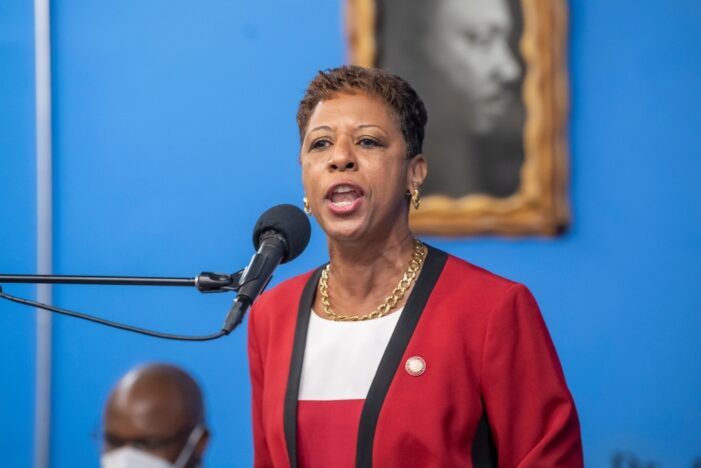NEW YORK, NY – JANUARY 17: New York City Council’s Speaker Adrienne Adams speaks during a Martin Luther King Jr. Day event in Harlem on January 17, 2022 in New York City. (Shutterstock)
City Hall, NY – Speaker Adrienne Adams, Deputy Speaker Diana Ayala, and the chair and members of the Council’s Immigration Committee expressed major concerns about the City’s plan to relocate its Humanitarian Emergency Response and Relief Center from Orchard Beach to Randall’s Island. They cited the island’s similar environmental challenges, with flood risks in the middle of hurricane season and the exposure to increasingly colder weather exacerbated by being on the water surrounded by the East River. They urged Mayor Adams’ Administration to consider alternative indoor locations to more humanely provide emergency relief and intake services to people seeking asylum. Council members highlighted that there are approximately 10 large-scale hotels in Manhattan, which are currently closed and might offer indoor space to host intake and relief services for newly arriving asylum seekers. Staffing for these hotel-based relief centers could also offer opportunities for hotel workers, who lost their jobs in the closures, to return to work.
In addition, Council leaders also highlighted the urgent need for the City to act to implement solutions to reduce the lengthy stays in its homeless shelters that have historically strained the system. Permanent affordable housing with supportive services must be prioritized as the City faces a growing unhoused population. These solutions include reviewing closed hotels for conversion to supportive housing that can provide permanent affordable housing with supportive services for people to transition out of the City’s shelter system. In addition to the 10 large hotels, with room-counts ranging from 1,025 to 478, there are over 70 additional closed hotels – like the Gramercy Park Hotel – that could be assessed for conversion to supportive housing. The Council has cumulatively identified that there are over 15,000 such rooms across the city. The Times Square – a former hotel building acquired in 1991, which currently operates as a supportive housing site of over 650 units, can serve as a practical model. The site provides onsite supportive services for low-income and formerly homeless adults, people with mental health challenges, and New Yorkers living with HIV/AIDS. The expansion of supportive housing could help reduce homelessness and ensure New Yorkers in need of mental health and social services receive assistance to attain stability, addressing two different crises facing the city.
The Council also encouraged the City to eliminate bureaucratic obstacles and pursue policy changes to facilitate the faster transition of people out of homeless shelters to reduce stress on the system that is necessitating emergency expansion of temporary shelters. These changes include improved access to CityFHEPS and supportive housing placements, and adequate staffing of key agency operations by:
- Eliminating the rule that requires people to remain in the shelter system for 90 days before becoming eligible for the CityFHEPS rental voucher program;
- Reducing the number of homeless families with children who are needlessly shuffled between conditional shelter placements by removing administrative barriers and advocating for the State to reevaluate verification requirements (families can be repeatedly required to return to the PATH Intake Center to reapply and be placed, promoting instability and unnecessarily extending the timeframe to access supports transitioning out of the shelter system);
- Resolving bureaucratic errors and inefficiencies in the application process for CityFHEPS and supportive housing that block people from accessing the opportunities to transition from the shelter system;
- Prioritizing hiring of Department of Social Services (DSS) staff who help process CityFHEPS applications and supportive housing placements, to both reduce backlogs that currently occur and prepare for an increase in applications;
- Tackling source-of-income discrimination that blocks people with rental vouchers from securing apartments by ensuring adequate staffing and operational capacity of the Source of Income Unit at the Commission on Human Rights.
“Our city is grappling with a homelessness crisis exacerbated by an international emergency that we did not create, but demands effective and compassionate responses,” said Speaker Adrienne Adams. “While an emergency relief center providing more effective intake services for asylum seekers than the Port Authority makes sense, neither outdoor locations of Orchard Beach nor Randall’s Island are adequate. Given its own flood risks in the middle of hurricane season and colder temperatures from exposure to the East River as winter approaches, Randall’s Island is inconsistent with humanitarian relief. There are better options that New York City should explore to provide healthier and safer conditions for people who have already experienced so much trauma.
“It is also imperative to now fix longstanding issues in our approach to homeless services that keep people in temporary shelters longer than necessary and make us overly reliant on the shelter system,” continued Speaker Adams. “Inefficient policies and bureaucracy slow access to rental housing vouchers and supportive housing placements, which we need to focus on fixing to move people into available permanent housing. Our city also lacks affordable permanent housing stock that can partially be addressed by exploring practical conversions of unused properties to supportive housing. This is a crisis that does not come with easy solutions, but it is our collective responsibility to collaboratively confront it. The Council is committed to being a constructive partner to address these complex challenges, providing longtime unhoused New Yorkers and people seeking asylum with the support they deserve that can benefit us all. We can address many of the major challenges facing our city with a bold, forward-thinking approach that reduces homelessness, improves public health, and advances safer communities.”
“People seeking asylum searching for safety and stability, face a backbreaking journey to New York City,” said Deputy Speaker Diana Ayala, Chair of the Council’s General Welfare Committee. “We must find a way to help and provide them with adequate shelter, and putting them in another location that is a carbon copy of the Orchard Beach location is not a suitable one. We understand this is an unusual and difficult situation which has compounded our overstressed shelter system. The Council is focused on finding solutions to address the current migrant crisis, which is why we’ve identified more suitable locations for an intake and relief center we believe the administration should consider. At the same time, we need to address the root of the problem which is the lack of supportive housing and continued bureaucracy of getting people who are already in our shelter system into permanent housing. We cannot afford to keep expanding our temporary shelter system without focusing on expanding opportunities for people to transition out of shelter into permanent, stabilizing housing opportunities. We urge the Mayor to seriously reconsider this proposal and to move forward with a plan that provides safer and humane conditions to those seeking relief in our city.”
“At our Immigration Committee hearing, the deep-seated issues with the proposed HERRC on Orchard Beach were painfully clear. However, the Administration’s switch to Randall’s Island is not the remedy this Council is looking for or our city needs. Many of the issues we pointed out at the Orchard Beach location still remain. From the substandard living conditions, to the outdoor tent structure, to its location in a flood zone and transit desert—it is clear that this plan will be both an operational and moral failure if it is carried out,” said Immigration Committee Chair, Council Member Shahana Hanif. “Any facility used to house asylum seekers overnight must be a brick and mortar building. The outdoor tent city model is unnecessary when there are other options, and it simply will not work. Further, conditions must meet the bare minimum standards set by our Right to Shelter laws. As partners in government, we demand transparency and collaboration in finding solutions. Asylum seekers deserve a compassionate and humanitarian response from our City. We can and must do better.”
“Even before seeing this weekend’s flooding, it was beyond clear that the Orchard Beach HERRC was a wholly inappropriate location and Randall’s Island is similarly problematic,” said Council Member Rita Joseph. “I urge the Mayor, in the strongest possible terms, to work to find a more thoughtful and humane location to protect the safety, health, and well-being of asylum seekers in our city. The asylum seekers who have arrived to our city have already gone through so much trauma, and we cannot allow poor planning to add on to what they have already experienced.”
“All New Yorkers have a right to clean, dignified and safe shelter. That includes our newest arrivals,” said Council Member Shekar Krishnan. “The proposed tent system for Randall’s Island falls well short of these standards, similar to Orchard Beach. We must do better for those who have been through so much to get here, as well as those who’ve long been through our homeless shelter system. The Council is putting forward sound alternatives that need to be seriously considered to help address these crises. We urge Mayor Adams and his administration to work collaboratively with us, as well as our partners in federal and state government, to arrive at better solutions. As winter approaches, the situation is only going to become more urgent.”
“As we continue to face this humanitarian emergency, we must do what New York has always done and open our arms as a City of care and compassion,” said Council Member Pierina Sánchez. “As a right to shelter locality, we have a duty to house every individual who needs us and as a sanctuary city, we must care for those who enter the U.S. in search of a better life. Following Friday’s hearing and severe flooding this weekend, I shared grave concerns with the Humanitarian Emergency Relief Center proposed at Orchard Beach, regarding transit and amenity access, as well as protection from the elements. Some but not all these important concerns are mitigated with the announcement of Randall’s Island. When I held an executive budget hearing as Chair of Housing and Buildings, my colleagues and I impressed upon the administration the expand our investment to build more affordable and supportive housing. This humanitarian crisis again underscores why it is crucial to unburden our shelter system by creating more permanent affordable housing faster. As we approach winter, we need indoor options to provide migrants protection from the elements. I join my colleagues in calling for the administration to delve into utilizing vacant buildings in the City.”



